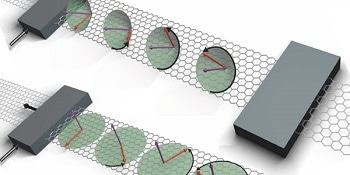May 11 2016
An article published today in Nature Communications presents a new method to determine the spin lifetime anisotropy of spin-polarized carriers in graphene using oblique spin precession.

The work, led by ICREA research Prof Sergio O Valenzuela, Group Leader of the ICN2 Physics and Engineering Of Nanodevices Group, demonstrates spin-lifetime anisotropy measurements in graphene and discusses them in light of current theoretical knowledge.
One of the most fascinating puzzles for the graphene and spintronics communities is identifying the main microscopic process for spin relaxation in graphene. Conventional relaxation mechanisms have yielded contradictory results when applied to single-layer graphene. In an article published today in Nature Communications, researchers from the Institut Català de Nanociència i Nanotecnologia (ICN2) determine the spin lifetime anisotropy of spin-polarized carriers in graphene, which is expected to generate valuable information to overcome the above puzzle.
The present work demonstrates spin-lifetime anisotropy measurements in graphene and discusses them in light of current theoretical knowledge. It has been coordinated by the ICREA Research Prof Sergio O. Valenzuela, Group Leader of the ICN2 Physics and Engineering Of Nanodevices Group, in collaboration with the INPAC - Institute for Nanoscale Physics and Chemistry (Leuven, Belgium). The first author of the article is Bart Raes, from ICN2.
The anisotropy is determined using a novel method based on oblique spin precession, a change in the orientation of the rotational axis of a rotating body. In contrast to prior approaches, the method does not require large out-of-plane magnetic fields and thus it is reliable for both low and high carrier densities. The authors first determine the in-plane spin lifetime by conventional spin precession measurements with magnetic fields perpendicular to the graphene plane. Then, in order to evaluate the out-of-plane spin lifetime, they implement spin precession measurements under oblique magnetic fields that generate an out-of-plane spin population.
The results show that the spin lifetime anisotropy of graphene on silicon oxide is independent of carrier density and temperature down to 150 K, and much weaker than previously reported. Indeed, within the experimental uncertainty, the spin relaxation is isotropic. Together with the gate dependence of the spin lifetime, this indicates that the spin relaxation is driven by magnetic impurities or random spin-orbit or gauge fields.
The authors underline that the microscopic properties of the graphene used in devices originating from different laboratories are not necessarily equivalent, owing to the graphite source or the processing steps that have been used. Thus, experimental results might vary among research groups. This underscores the importance of developing advanced spin transport characterization techniques and the systematic implementation using samples of different origin.
The authors conclude that spin relaxation anisotropy measurements on specific substrates and with a controlled number of deposited adatoms will be crucial to increase the spin lifetime towards the theoretical limit and to find ways of controlling the spin lifetime. That is the path to ultimately develop unprecedented approaches for the emergence of spin-based information processing protocols relying on graphene.
http://icn2.cat/en/news/3834-spin-lifetime-anisotropy-of-graphene-is-much-weaker-than-previously-reported